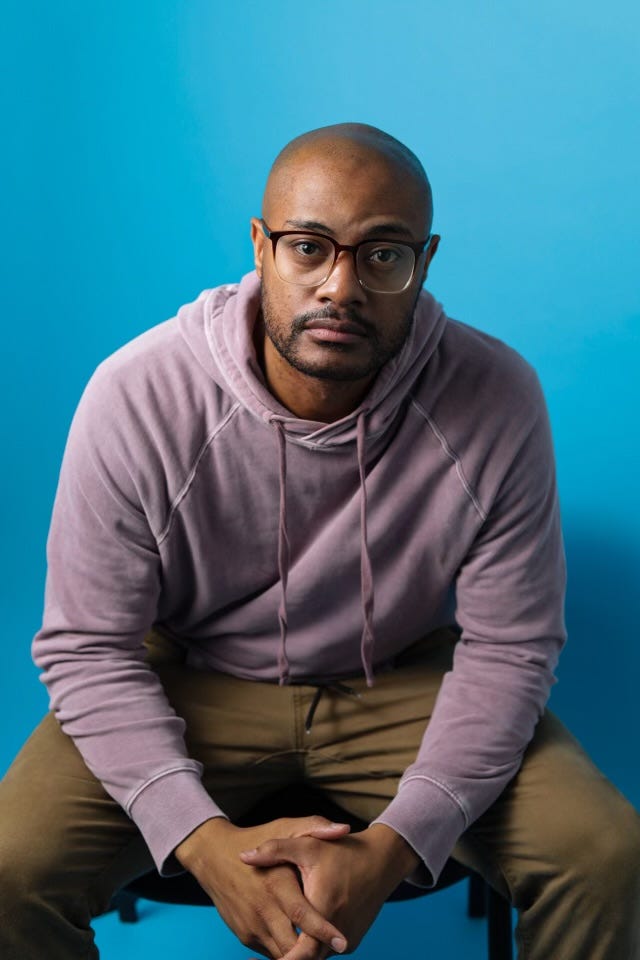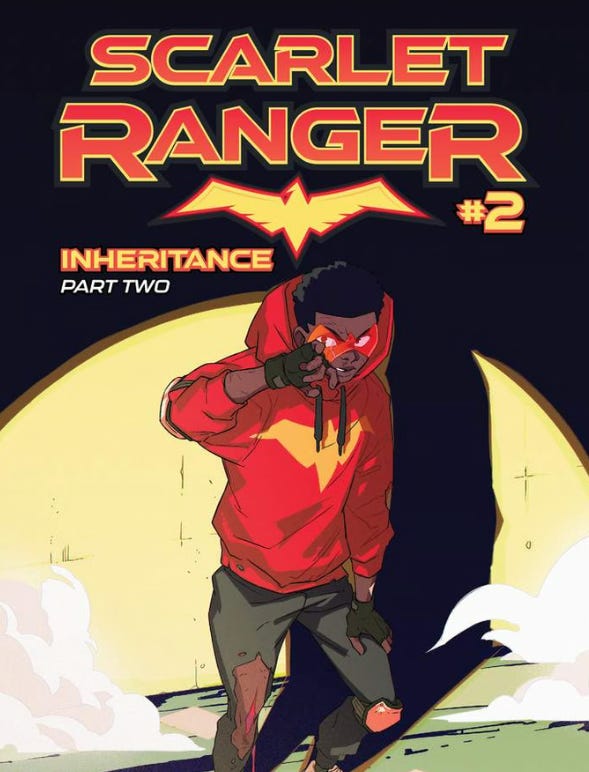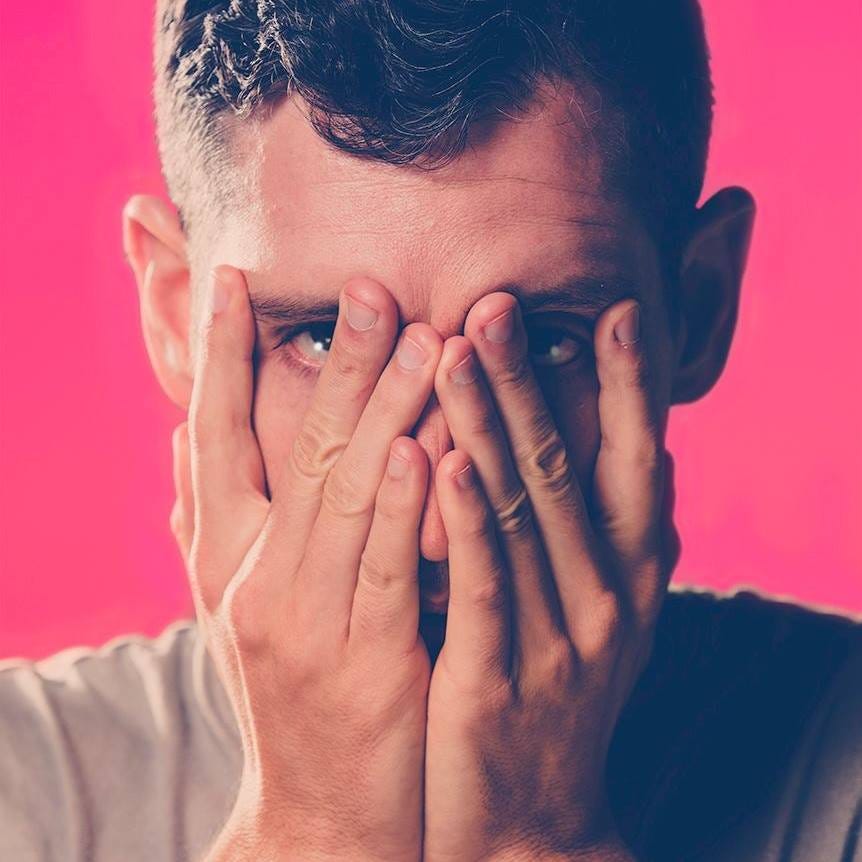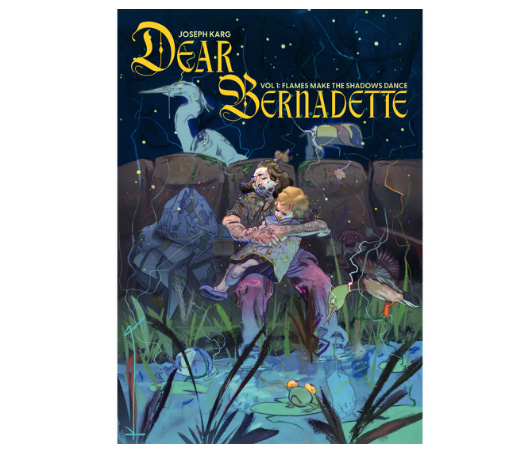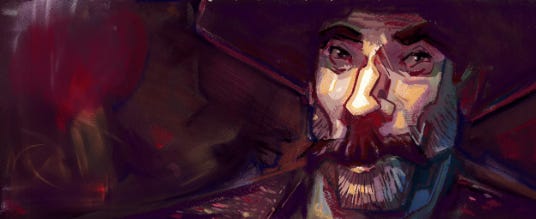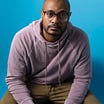Table of Contents
Introduction and Preview: Scarlet Ranger
Introduction and Preview
This month’s featured comic is Scarlet Ranger, which was written by Ro Lamb, illustrated by Riccardo Cecchi, with colors by Marcos Martins, and lettered by Lettersquids. It’s an ongoing superhero story about a young man who inherits the title of Scarlet Ranger from his grandfather. But when his grandfathers greatest enemy breaks out of prison we follow this young man as he is learning to protect his family, his city and ultimately the legacy his grandfather left for him.
The third issue is on Kickstarter until April 6th: https://www.kickstarter.com/projects/rolamb/scarlet-ranger-inheritance-part-3
An Interview with Ro Lamb
by Curtis Clow
Ro Lamb has been on the grind for years now, consistently putting out incredible work. I still remember when he DM’d me a few years ago to share one of his comics, and I was immediately impressed by how good it was. It’s no surprise to see him still pushing forward, creating even more amazing stories.
In this interview, we dive into his journey, his approach to making comics, and what keeps him motivated.
CURTIS: It looks like you made the leap and made your first Kickstarter for Scarlet Ranger back in 2021. What inspired you to launch your first campaign?
RO: Scarlet Ranger is the first writing that I have ever completed. I have been writing across various mediums for a long time. Music, poetry, short stories, novels, etc. There were so many starts and stops. I remember walking out of Black Panther in 2018 and making a promise to myself that I would write a comic book, finish it, and put it into the world. And that is where the journey began for me.
CURTIS: Over the years you’ve written in a range of mediums like novels, poems and more. What made you want to try out comics?
RO: Comics have always been appealing to me. As a kid I remember reading comics and falling in love with the art. I grew up in a strict household. So I actually wasn't allowed to read comics but I would sneak them anyway. Because of that I didn't grow up following the classic runs of specific writers or artists. But I would just get what I could, when I could. And so comics have always held a special place for me. When it came time to do Scarlet Ranger, I knew I wanted it to be a superhero story and it just made sense that it would be in the comic book format. From a practical side, Comic books just felt accessible. Novels take a long time. I didn't know what screenwriting software was at the and did not have access to it. A 20 or 24 page comic book felt like something I could do and do well.
CURTIS: What challenges comics writers face compared to other mediums? Why did you choose to make Scarlet Ranger a comic?
RO: I think the major challenge is understanding how to use the constraints and still tell a complete story, and additionally finding collaborators who you trust to help bring it to life.
With comic books, you have only so much space to tell the story you want to tell, create the world for your reader, and establish the character for them to follow in the world. Each medium has its strengths and weaknesses and the fun part, to me, is learning where those weaknesses or constraints are and playing with them. Writing comic books feels a lot like writing poetry. You have a limited number of words and space, how much of this world can we show?
I just saw it as that immediately. Like I said, it was a superhero story and that's what made sense to me and it felt doable. But also, as someone who writes across different mediums, I always want to honor the medium I am writing in. Of course, if someone wants to make this a move or TV show, we can talk. But the ultimate goal is for this to be a comic book. If the goal was for it to be a movie or TV show, that’s how I would have written it. That's how I honor the medium. Comic books isn't just a stepping stone; I love this shit.
CURTIS: Scarlet Ranger is such a fun concept. I can see influences like Static Shock and Miles Morales in your young hero. What inspirations have you drawn from for Scarlet Ranger?
RO: Yes. We get that a lot for sure. And they definitely were inspirations. But also Black Panther was a major influence. One topic I love to write about is intergenerational relationships and that was one thing that really spoke to me about Black Panther.
I don’t always know what I'm writing means at the moment. So i didn’t even consciously insert them but as I reflected on the patterns in SR and other pieces of writing, I realized that the theme of tradition and legacy shows up everywhere for me. So that was a major inspiration as the story continued to unfold.
CURTIS: Deciding to create an indie comic about a superhero feels like a big risk. It feels like an oversaturated genre, with most of the Big Two’s comics being superhero based, not to mention all the smaller publishers and indies that do superheroes. How did you find a way to carve out something unique within that space?
RO: I think this is one of those situations where I just didn’t know any better. It was until my second issue that people started to ask me about that. I had one creator say, “Wow I would have never done superheroes because it’s hard to stand out.”
I just didn't know. I started building the story in a way to just prove to myself that I can do this. I wasn't thinking about the market or what is happening in the field. I just wanted to create something and prove that I could do this.
And to be honest, sometimes I wish I had started with a sci fi or fantasy title. That is really where my passion and my love lies. But I think I was still on the creative side of things and as my journey has progressed I am realizing more and more how important it is to have both the creative and business savvy side. But when I was starting I had no idea that was even a thing. LOL
CURTIS: I see you’ve had to switch artists between some Scarlet Ranger issues. As an early creator, that’s something I had to deal with on some of my series. I know that can be rough, but it looks like you handled it well. How did you go about that, and what tips do you have for creators in the same position?
RO: You know I think the biggest tip and the most important is to always trust the artist. If you find someone who cares about the work and cares about your story, you gotta trust that they will bring everything together. And of course there are conversations and give and take, but I think I just went into each project, each artist switching with the mindset that things don’t have to be EXACTLY what I see.
I always tell the artist before we work that this script is filled with suggestions. There are some things that are really important to me and we can talk about those things but for the most part, if you think there is a better way to do it, then let's do it your way.
And the same mindset applies when I had to switch artists. Maybe the characters wont look exactly the same, or that building looks a little different. At the end of the day, I want them to be themselves and we can figure the rest out as we come to it.
CURTIS: What are your future plans for Scarlet Ranger? On Kickstarter you’ve been focused on this series. Do you have any plans to launch other series?
RO: Scarlet Ranger’s first arc will be complete, hopefully by the end of this year and I am working on the next arc for the series. I am excited to see where that goes!
I absolutely have other series I want to launch. I don’t want to be just a superhero guy, I want to play in some other genres as well. I am excited to bring those other stories to the world.
It is just a matter of organizing and scheduling getting the funds right to make sure everything is taken care of. I tried to start some other projects but I just haven’t been great at juggling them all so I gotta organize some things. But I think I'm gonna focus on Scarlet Ranger, get this first arc done and then figure out these other projects!
Why Just Creating Matters
by Caleb Palmquist
Like so many other comic book fans, my love of the medium started with superhero comics. Today I read relatively few stories with superheroes, but growing up I was all about the X-Men. I had a little collection of books from random series in my room - whatever I could find at the mall or whatever random issues were given to me as gifts.
I had no sense of the ongoing stories, continuity, or even really the concept of intellectual property. What I knew was that Cyclops was cool as hell, and he was a Boy Scout, just like me. He could blast people with his cool laser vision, he knew karate, and he had the respect of his team. He had hard decisions to make, but he always, always strove to do the right thing.
To me, it’s no coincidence that superhero stories have the enduring presence that they’ve enjoyed for the last near-century. They speak to us on a deep level, and they are just so damn fun.
As we were talking to Ro (both for this issue and for our podcast), one of the topics that came up was the flooded market of superhero comics. It’s a conversation I’ve heard (and been part of) dozens of times. It usually goes something like this:
“I have an idea for a superhero comic that I’d like to fund on Kickstarter.”
“There are already so many superhero comics on Kickstarter - not to mention the Big Two. Are you sure that’s a good idea?”
To be frank, it feels like a legitimate concern. Take a look at the comics category on any given day and you’re bound to see a bunch of super hero comics. At least, that’s the assumption I was working with up until recently.
Just now I scrolled through the comics category, and I counted less than ten active super hero books. Of those, only two were fully funded (Scarlet Ranger #3 was one of them). The number of super hero books on the platforms ebbs and flows, and I’m sure I caught it at a low point, but my finding today contradicts what I thought was true.
Of course, that begs the question: are there so few quality superhero books on Kickstarter BECAUSE super hero books don’t do well on Kickstarter (and therefore creators are choosing not to make them), or because creators just aren’t interested anymore?
I don’t think I’m unique in that superhero comics are the genre that first captured my imagination and got me dreaming about telling my own stories. While I can honestly say I haven’t thought about writing a superhero comic (outside of the occasional daydream of what my perfect X-Man team would be), I was struck by something Ro said in our interview:
“I wasn't thinking about the market or what is happening in the field. I just wanted to create something and prove that I could do this.”
That’s it. I just wanted to create something.
When I started making comics, I originally wanted to make Unicorn: Vampire Hunter as my first comic book, but I ultimately made the decision to make a different kind of book that at the time felt safer, more sellable. The book I went with was not successful. I worked hard on that book and hustled to get it in front of as many people as possible, but it just wasn’t catching fire.
It wasn’t until I came back around to my original idea (Unicorn: Vampire Hunter), that things really took off for me. That story is true to who I am as a creator - it’s a silly story about unicorns that taps into deep feelings about family, friendship, and forgiveness. It’s me, and it worked.
Sometimes the best thing to do is not to worry about what is going to sell, or what the market looks like right now. Sometimes the most important thing is to just make something that speaks to you.
Speaking of making things that speak to you, my interview with Joseph Karg below is all about how despite years of working on major projects like Archer and Marvel Snap, the project that felt the most true to him as a creator was a deeply personal one. Keep reading to check it out.
An Interview with Joseph Karg
by Caleb Palmquist
This month we had the opportunity to sit down with Joseph Karg, an incredible artist and someone I have known for years. Right now he has his first Kickstarter live in nine years, and while it is not a comic book, I think it’s worth checking out. The book is called Dear Bernadette, and it is both an art book and a series of letters written by Karg to his two year old daughter.
You can check out the Kickstarter here: https://www.kickstarter.com/projects/dearbernadette/dear-bernadette-a-collection-of-illustrations-and-letters
CALEB: When we first met you were tabling at Dragon Con in Atlanta. At the time you were selling a graphic novel you had Kickstarted in 2014. That was a huge inspiration for me, and part of the reason I ended up launching my first Kickstarter in 2017. That said, you’ve been off the platform for nearly a decade. Why come back now?
JOSEPH: In the decade since I Kickstarted my graphic novel El Grande, my life has taken a lot of turns. El Grande took ten years to create, and while we successfully raised enough to print and ship a few hundred books, there was nothing left over for marketing. My partner and I had different visions for the future of the project, and ultimately, we went our separate ways.
After that, I spent years working toward what I thought was my big goal—getting published by Marvel or DC. My friend Chris Bivins and I built a portfolio, and in 2019, we got two major breaks:
1. A six-issue miniseries with writer Paul Jenkins (Wolverine: Origin) for a Canadian startup.
2. A contract with Marvel to illustrate key imagery for what became Marvel Snap!
Things were finally moving in the right direction. But then… 2020 happened.
The miniseries vanished overnight, crushed by Covid. Marvel Snap kept going, but the longer we worked on it, the harder it became to enjoy. We weren’t being hired for our vision or deep knowledge of these characters—we were a tool for someone else’s version of them. And let me just say for the record: Electro is NOT a bodybuilder. But I digress.
Then in April 2023, my daughter Bernadette was born. At that point, I had been teaching college art for a decade and freelancing for nearly 20 years. My skills were stronger than ever, but my goal of having a book on the shelf that truly represented me had never been realized. I didn’t want my daughter to grow up seeing me as someone who just worked for giant corporations that barely knew my name. I wanted her to grow up knowing her dad made beautiful books, compelling stories, and work that truly mattered.
That’s where Dear Bernadette comes in. It’s a book that collects two years of my best illustrations, paired with letters to my daughter—on everything from film, politics, and comedy to death, creativity, and why you should never back into a parking space. (Seriously, don’t be a backer-inner.)
Kickstarter has always been an exciting space to me. Some of my favorite artists in the world have built their careers here. The reason it took me so long to return is simple—I didn’t want to come back until I had something great. Now I do, and I can’t wait to share it with the world.
CALEB: Dear Bernadette is a deeply personal work. It’s clearly a love letter to your daughter, but now you’re bringing it to a wider audience. Who do you think this book appeals to (aside from your daughter of course)?
JOSEPH: It’s funny—if you’d asked me this six months ago, I would have said film geek dads with daughters. That felt like the natural audience. But now that I’ve sent a rough draft to early readers, the strongest responses have come from women.
I think a lot of women have fathers who, for one reason or another, never took the time—or never had the ability—to speak to them this way. To tell them what they know, what they fear, what they love, and most importantly, how much they are loved.
My own father left when I was three years old, so when I became a father myself, I felt the weight of that responsibility in a way that shaped everything. I didn’t just want to be present for my daughter—I wanted to actively shape her world, to tell her all the things my father was never there to say. To impart wisdom, build confidence, and create a foundational truth in her life: that my love for her is unconditional and unwavering.
And what better way to do that than by taking the skills I’ve spent decades honing—art, storytelling, reflection—and dedicating them entirely to her?
So yes, Dear Bernadette is written for my daughter, but it’s also for anyone who has ever longed to hear these kinds of words from their own parents. It’s for those who never got them, for those who wish they had said them, and for those who might be trying to say them now.
CALEB: Your career as an artist has been prolific and eclectic, drawing everything from comics, to comedy posters, to cards for games like Marvel Snap. What has been your favorite thing to work on?
JOSEPH: This project, BY A MILE, has been the most fulfilling thing I’ve ever worked on—for a multitude of reasons. But let me unpack that a bit.
My career as an artist has always been riddled with insecurity. I didn’t grow up drawing—at 19, when I walked into art school, I was just a kid who loved comics and could barely draw a stick figure. By the time I graduated, my skills had grown considerably, but I was still far behind my peers.
Those first years out of school were brutal, but I was a hustler. I took any job I could—tutoring lawyers’ kids in animation, designing painfully simple graphics for those same lawyers’ court cases… sometimes they even asked me to mow their lawns or wash their cars. Thank God for lawyers, am I right? (laughs)
As time went on, my skills got stronger, and better jobs started coming my way. But I still had this mentality that every client knew better than me. I was too malleable as an illustrator, too eager to please, and as a result, I kept making work I didn’t actually like.
That changed in 2015 when I offered to illustrate weekly posters for a New York City comedy show called Whiplash. I told the booker, “I’ll do this for free if I can collect them into a book when the year is over.” He agreed. And even though my Kickstarter for that book ultimately failed, it was the most fun I’d ever had making art. To this day, those posters are still some of the work I’m most proud of.
And that’s why Dear Bernadette is my favorite project. For the first time in my career, I am fully in control—not shaping my work around a client’s vision, but creating something deeply personal, meaningful, and lasting. I’m making something I love, and that makes all the difference.
CALEB: Circling back, when we first met I knew you as a comic book writer. Do you think you’ll ever return to that world, as either an artist or a writer?
JOSEPH: It’s funny to hear you say that because, in truth, I never really saw myself as a writer—not until Dear Bernadette.
My first experience writing was in college when my professor asked me to help him write his graphic novel, El Grande. At the time, I was already punching up scripts for my classmates’ animated shorts, so it made sense. And don’t get me wrong—I’ve always been funny. And funny people are interesting. And what is good writing if not funny and interesting? (laughs)
But when El Grande finally came out, I didn’t feel like a writer. The process didn’t resemble what I now consider writing to be. I wasn’t chosen for my vision or storytelling skills—I was hired as a tool to execute someone else’s ideas. To put it bluntly, I spoke better English than he did.
If I ever felt like a real writer, it was during the three years I spent performing stand-up comedy. Every word was 100% me. But even then, it didn’t feel like writing in the way that Dear Bernadette does.
The shift happened when I stopped trying to write in anyone else’s voice and just wrote like myself. Writing a letter was the perfect way to unlock that. But as I kept writing these letters, they started shaping themselves into something bigger. I realized I had a lot more to say than I thought.
All these skills had been secretly building in the background—through thousands of hours of class discussions, lectures, books I’ve read, and conversations with brilliant people like Rory Scovel or Rosebud Baker. Now, they were taking form in a way I never expected.
So to finally answer your question—yes, absolutely. I’ve never felt more confident, capable, or excited to write and draw comics than I do right now.
CALEB: What’s next after Dear Bernadette? Any future Kickstarter plans?
JOSEPH: Oh yes—BIG plans. Unless something drastic changes, I plan to release at least one new project per year on Kickstarter for the next five years.
Through Dear Bernadette, I’ve realized that the three things I care most about as an artist are being a father, a teacher, and a storyteller. This project allows me to be all three, but my next book leans even more into Joseph Karg “The Father.”
My next Kickstarter will be a children’s book, a project designed for Bernadette at age 2-3—something I can read to her immediately. Dear Bernadette was written for her as a teenager, but this book will be one she can hold in her hands right now.
After that, I’m planning a graphic novel, and then I’ll circle back to Volume 2 of Dear Bernadette. My long-term vision for this series is to release a new volume every two years, with more narrative-driven fiction in between.
The ultimate goal? By the time she turns 13, I’ll be able to gift her a six-book box set chronicling her childhood, my thoughts on the rapidly changing world, and all the lessons I wanted to pass down.
I see Kickstarter as an essential part of that journey, and I’m excited to keep building on what Dear Bernadette has started.
Thank you so much for the interview. I loved answering these questions, and I hope your readers find me funny and interesting HAHAHAHA...oh god.
Here’s the link to the Kickstarter again: https://www.kickstarter.com/projects/dearbernadette/dear-bernadette-a-collection-of-illustrations-and-letters
Signing Off
by Curtis Clow and Caleb Palmquist
Thanks for checking out the sixth issue of Ink to Table. If you have a suggestion for an amazing comic book coming up, or you have a comic you’d like featured, please feel free to contact us and let us know! We now have companion podcasts for each issue where we chat with the creators of the comic we’re covering. Don’t forget to subscribe!
This month’s comic was Scarlet Ranger. It runs on Kickstarter until Sunday, April 6th. If you’d like to check it out, here’s the link: https://www.kickstarter.com/projects/rolamb/scarlet-ranger-inheritance-part-3
Until next time,
Curtis & Caleb











